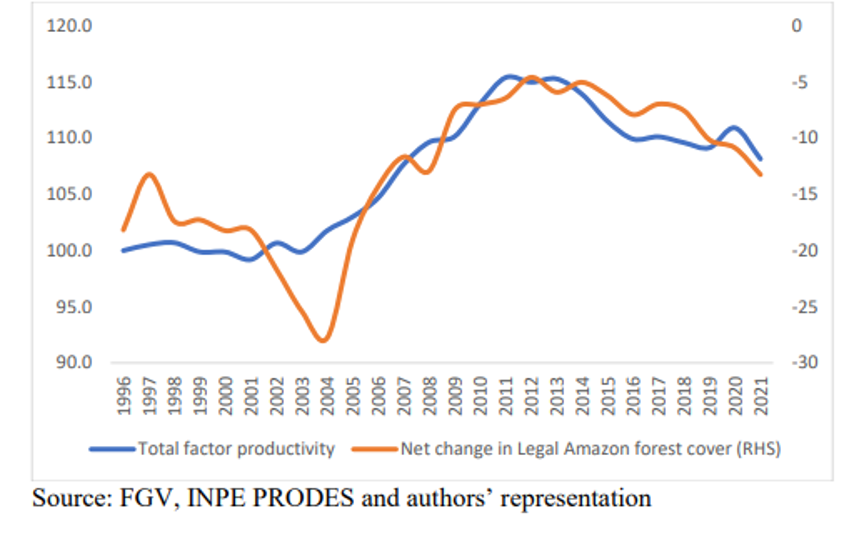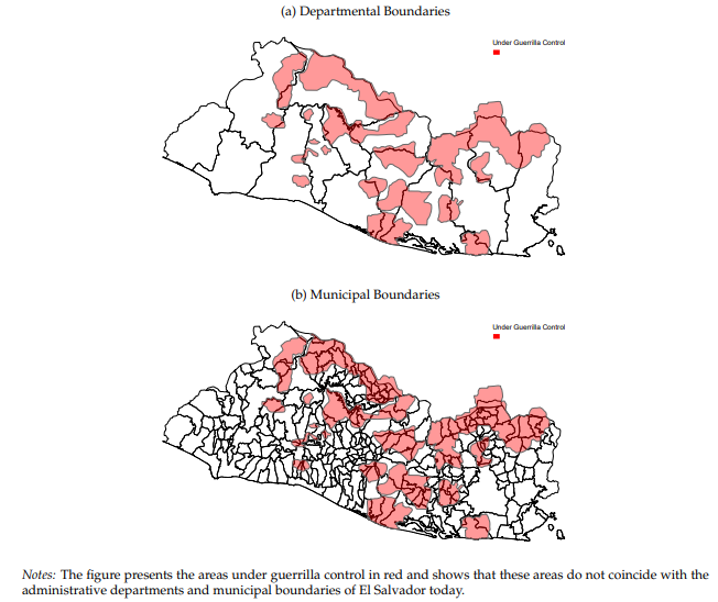 Deforestation and land use change are among the largest source of net CO2 emissions for Brazil. Photo by Jeremy Bishop on Unsplash
Deforestation and land use change are among the largest source of net CO2 emissions for Brazil. Photo by Jeremy Bishop on Unsplash
This blog is a biweekly feature highlighting recent working papers from around the World Bank Group that were published in the World Bank’s Policy Research Working Paper Series. This entry introduces four papers published from November 1 to November 15 on various topics, including deforestation, governance, and gender-based discrimination.
The first two papers we introduce take us to Latin America. In A Macroeconomic Perspective of Structural Deforestation in Brazil's Legal Amazon, Joaquim Bento de Souza Ferreira Filho and Marek Hanusch explore the role of economic productivity in shaping deforestation. In Rebel Governance and Development: The Persistent Effects of Guerrillas in El Salvador, Lelys Dinarte-Diaz and coauthors investigate the economic, social, and political consequences of temporary territorial control by guerrillas during the Salvadoran Civil War.
-
Deforestation and land use change are among the largest source of net CO2 emissions for Brazil. A Macroeconomic Perspective of Structural Deforestation in Brazil's Legal Amazon explores the macroeconomic drivers of deforestation. The paper demonstrates that productivity gains in the agriculture sector increase deforestation, while such gains in non-land intensive sectors (such as manufacturing) reduce deforestation by attenuating the relative competitiveness of agriculture. Higher productivity in other parts of Brazil also reduces incentives for forest conversion in the Legal Amazon. Figure 1 below shows strong correlation between national total factor productivity and deforestation in the Legal Amazon.
Figure 1: Total factor productivity (index, LHS) and year net change in Legal Amazon forest cover ( ‘000km2, RHS)

-
During the Salvadoran Civil War, the guerrillas displaced state authorities and promoted the creation of self-governing institutions that were highly representative of local values and openly distrusted the state and elites. Rebel Governance and Development: The Persistent Effects of Guerrillas in El Salvador shows that areas once under guerrilla control have experienced worse economic outcomes about 30 years after the guerrillas first controlled them, relative to adjacent areas that were then controlled by the formal state. The results suggest that informal community institutions in guerrilla-controlled areas led to enduring land fragmentation and disengagement with the government. The paper argues that when non-state actors develop governance institutions as an alternative to the state, this can lead to negative development effects through lasting norms of distrust of out-groups.
Figure 2: Guerrilla-Controlled Territories and Administrative Boundaries

The final two papers we introduce examine topics related to gender discrimination. In Customer Discrimination in the Workplace: Evidence from Online Sales, Erin Kelley and coauthors measure the impact of gender-based customer discrimination on the productivity of online sales agents working across Sub-Saharan Africa. In Evening the Credit Score ? Impact of Psychometric Loan Appraisal for Women Entrepreneurs, Salman Alibhai and coauthors test an innovative solution to providing larger loans to women who lack collateral assets.
-
Customer Discrimination in the Workplace: Evidence from Online Sales provides new evidence on the magnitude of gender-based discriminatory behavior by customers in the workplace. The authors run a randomized experiment with an online travel agency whose offices are scattered across Sub-Saharan Africa. The company sells flights and hotels and hires local sales agents to assist customers who are mainly from other parts of the continent. The paper studies workers who chat with customers online to answer questions and increase sales. This context allows authors to measure worker productivity through customer purchases and rich patterns of engagement, including bargaining and harassment, through chat transcripts. The paper finds that the assignment of a female-sounding name leads to 50 percent fewer purchases by customers. The results appear to be driven by relatively lower interest in engaging with female workers.
-
Women face more difficulty than men in getting loans of larger size, longer duration, individual liability, and more flexible terms as a result of lower rates of ownership of collateralizable assets. In Evening the Credit Score? Impact of Psychometric Loan Appraisal for Women Entrepreneurs the authors test the impact of using psychometric credit scoring as a substitute for collateral for loans up to US$7,500, via a randomized controlled trial with a microfinance institution in Ethiopia. The paper finds positive impacts on women’s access to credit, and survival of their firms during the COVID-19 pandemic and conflict.



Join the Conversation